12 Best Google Cloud Alternatives Shortlist
After assessing an ocean of tools, I've cherry-picked 12 Google Cloud alternatives, each aimed to solve your unique tech challenges. Let's dive in!
- Heroku - Best for developers seeking a user-friendly platform-as-a-service
- Tencent Cloud - Best for businesses eyeing expansion in Asia
- Lumen Public Cloud (Legacy) - Best for those requiring robust and secure networking capabilities
- OVHcloud Public Cloud - Best for cost-effective, scalable cloud solutions
- NetApp Cloud Services - Best for businesses prioritizing storage and data management
- Panzura - Best for those who require high-performance multi-cloud data services
- Granulate - Best for businesses needing real-time cloud optimization
- pax8 - Best for cloud procurement and management
- Oracle Cloud Infrastructure (OCI) - Best for enterprises desiring a comprehensive suite of cloud services
- IBM Cloud - Best for businesses needing a hybrid multi-cloud platform
- AWS CloudWatch - Best for extensive monitoring and observability
- Microsoft Azure - Best for businesses seeking deep integration with Microsoft services
Google Cloud Platform instantly comes to mind when searching for a versatile cloud hosting solution. This comprehensive suite offers everything from storage services to serverless computing, letting you develop and deploy everything from simple web applications to intricate Android app ecosystems using its App Engine. It even extends to integrating APIs, managing permissions, and offering end-to-end authentications - all under the recognizable banner of Google that also powers services like Gmail.
But what if you're seeking the best alternative? You may need more substantial alignment with Windows environments or want a different managed services approach. These nuances can lead you to explore beyond Google Cloud, to platforms that better serve your unique circumstances. I've spent countless hours exploring these alternatives. Based on my experiences, I'm confident that my recommendations will give you compelling choices to consider for your cloud hosting needs.
What is a Google Cloud Alternative?
Google Cloud, a suite of cloud computing services offered by Google, caters to a diverse audience, including startups, midsize companies, and large enterprises. It provides a robust platform for data storage, analytics, Content Delivery Networks (CDN), IoT, machine learning, AI, and other offerings. Its strong global network and integrations with Google's products make it an attractive choice for businesses immersed in the Google ecosystem.
However, users might seek Google Cloud alternatives for a variety of reasons. They may need a more cost-effective solution compatible with Android, iOS, and Windows mobile OS, better customer support, unique features in web apps, or even something as simple as a better fit with their tech stack. In the rapidly advancing world of technology, having choices allows businesses to select the right tools that align perfectly with their specific needs and objectives.
Overview of the 12 Google Cloud Alternatives
1. Heroku - Best for developers seeking a user-friendly platform-as-a-service
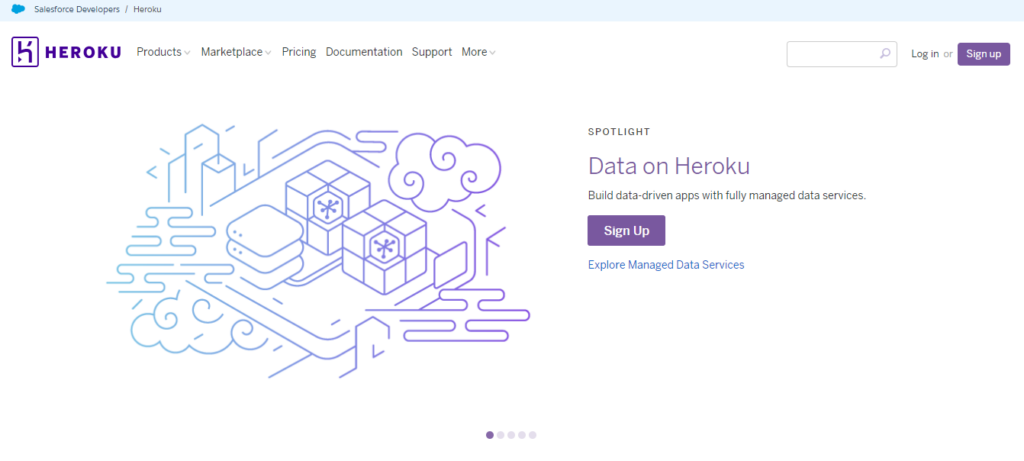
Heroku is a cloud platform as a service (PaaS) that lets developers build, run, and operate applications entirely in the cloud. As a user-centric platform, it provides a developer experience with minimal setup required.
Why it's a good Google Cloud alternative:
I chose Heroku because it simplifies deploying, scaling, and managing applications. Unlike Google Cloud, which can feel complex and overwhelming, Heroku's interface is intuitive and user-friendly, making it ideal for developers who prioritize simplicity and speed. I deem it the best platform for those seeking a user-friendly platform-as-a-service.
Standout Features & Integrations:
Heroku offers features such as Heroku Runtime, which lets your apps run inside dynos - smart containers on a reliable, fully managed runtime environment. The Heroku DX (Developer Experience) is another key feature that provides a productive and engaging developer experience. Heroku integrates well with other services like GitHub for source control, New Relic for monitoring, and Papertrail for logging.
Pricing:
From $7/dyno/month (billed annually)
Pros:
- Streamlined deployment and scaling of applications
- User-friendly interface that promotes productivity
- Strong integration with third-party services
Cons:
- Could be costly for larger applications
- Not the best choice for heavy computation tasks
- Limited control compared to Infrastructure as a Service (IaaS) providers
2. Tencent Cloud - Best for businesses eyeing expansion in Asia
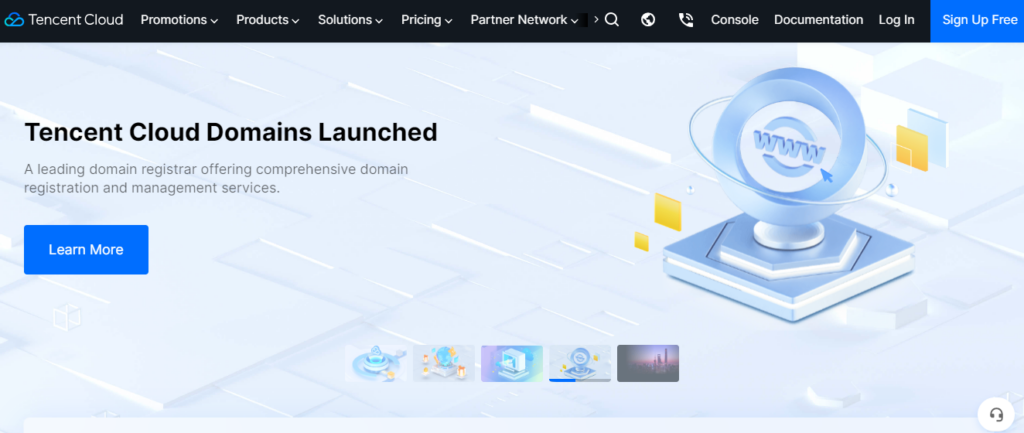
Tencent Cloud is a suite of cloud services providing numerous solutions such as computing, storage, and database services. Its substantial presence in Asia makes it a strategic choice for companies aiming for growth in this region.
Why it's a good Google Cloud alternative:
I selected Tencent Cloud because of its expansive network in Asia, which is less extensively covered by Google Cloud. This aspect sets Tencent Cloud apart. It is a strategic choice for businesses intending to expand in Asia, offering them the advantage of local network speed and lower latency, which are crucial for maintaining a positive user experience.
Standout Features & Integrations:
Tencent Cloud features include flexible computing services like CVM and Tencent Kubernetes Engine, robust data storage solutions, and a comprehensive suite of application services. Tencent Cloud also has a broad ecosystem, integrating with other services like WeChat, QQ, and Tencent Games.
Pricing:
From $8/user/month
Pros:
- Broad network coverage in Asia
- Easy integration with Tencent ecosystem
- Comprehensive suite of cloud services
Cons:
- Documentation might be difficult to navigate for non-Chinese users
- Customer support can be less responsive compared to other providers
- The interface might not be as user-friendly for new users
3. Lumen Public Cloud (Legacy) - Best for those requiring robust and secure networking capabilities

Lumen Public Cloud is a comprehensive suite of cloud services built to emphasize secure and reliable networking. For organizations with demanding networking requirements, Lumen provides a solid solution.
Why it's a good Google Cloud alternative:
I chose Lumen Public Cloud for its strong focus on networking capabilities, an aspect that differentiates it from Google Cloud. Their approach to network security and speed is top-notch, making them an excellent choice for organizations with demanding networking needs.
Standout Features & Integrations:
Lumen Public Cloud offers robust features like fast provisioning of virtual servers, load balancing for optimal traffic distribution, and robust network security measures. It also integrates well with a variety of tools, such as Terraform and Kubernetes, which can facilitate the automation and orchestration of your cloud resources.
Pricing:
From $12/user/month
Pros:
- Strong focus on networking capabilities
- Fast provisioning of virtual servers
- Good integration with automation tools
Cons:
- Pricing may not be as competitive as other providers
- Transitioning to Lumen Cloud from other providers can be complex
- The user interface could use some improvements in usability
4. OVHcloud Public Cloud - Best for cost-effective, scalable cloud solutions
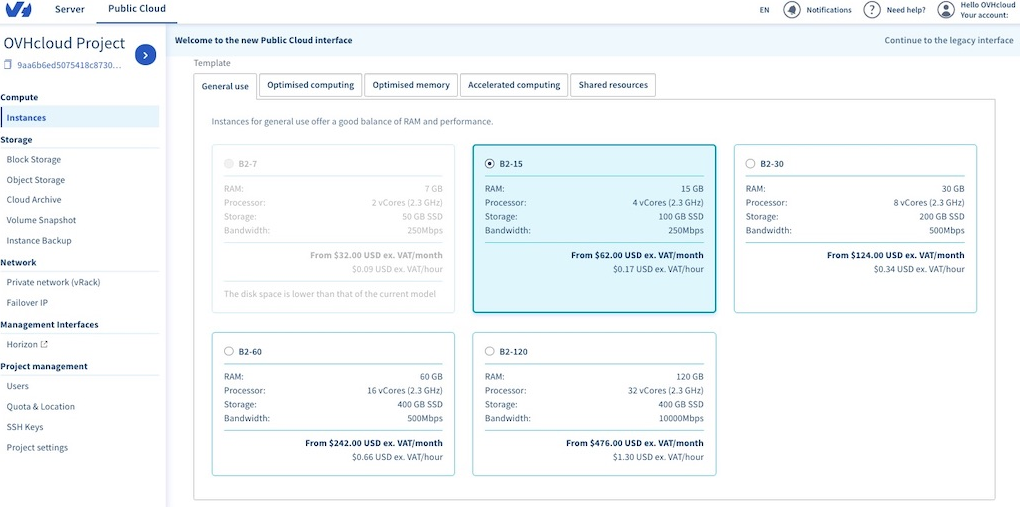
OVHcloud Public Cloud is a flexible, cost-effective cloud solution for growing businesses. Their pricing models and resource scalability stand out for those seeking affordability without compromising performance.
Why it's a good Google Cloud alternative:
I selected OVHcloud Public Cloud because of its affordability and scalability. This cost-effectiveness, coupled with the ability to adjust resources as needed, really sets it apart. It's ideal for companies seeking a financially savvy way to scale their cloud operations.
Standout Features & Integrations:
OVHcloud excels in providing flexible and scalable virtual private servers, object storage, and load balancers. It integrates well with popular platforms like Docker, Kubernetes, and Ansible, allowing you to extend and automate your infrastructure.
Pricing:
From $5/user/month
Pros:
- Highly cost-effective
- Great scalability options
- Wide range of integrations
Cons:
- Less comprehensive compared to larger providers
- Support responses could be faster
- User interface may not be as intuitive as other platforms
5. NetApp Cloud Services - Best for businesses prioritizing storage and data management
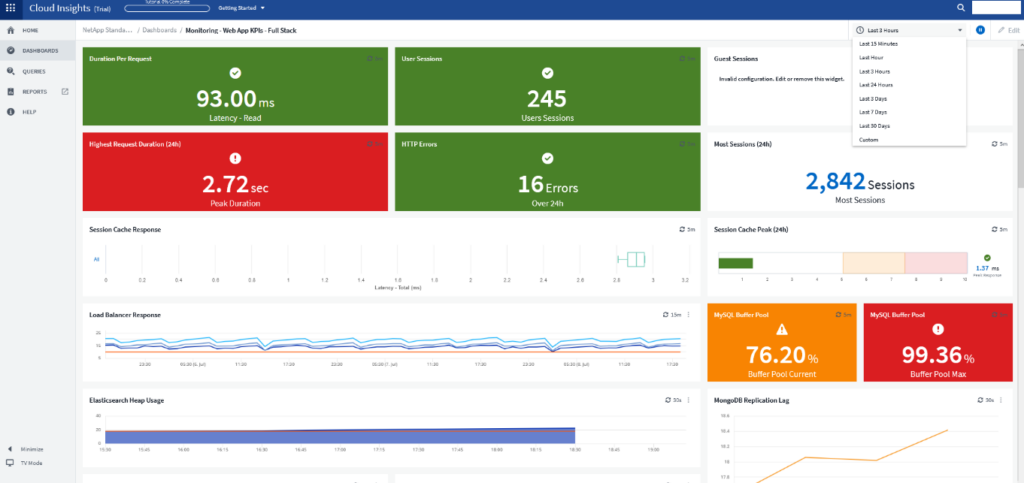
NetApp Cloud Services offers an extensive suite of cloud storage, data backup, and disaster recovery solutions. Its powerful data management tools and robust storage capabilities make it ideal for businesses focused on maintaining secure and accessible data storage.
Why it's a good Google Cloud alternative:
I chose NetApp for its specialized focus on storage and data management, which it delivers excellently. Compared to Google Cloud's broader scope, NetApp's concentrated approach to data services stands out, making it the optimal choice for businesses where data storage and management are of primary importance.
Standout Features & Integrations:
NetApp excels with its diverse storage offerings, including block, file, and object storage. Also noteworthy are its data backup and disaster recovery services. Key integrations include popular cloud platforms like AWS, Azure, and Google Cloud, allowing for a harmonized data management ecosystem.
Pricing:
From $10/user/month
Pros:
- Superior storage and data management offerings
- Robust disaster recovery and backup services
- Smooth integration with major cloud platforms
Cons:
- Not as comprehensive for non-storage needs
- Can be complex to set up and manage
- Cost may be prohibitive for smaller businesses
6. Panzura - Best for those who require high-performance multi-cloud data services

Panzura provides multi-cloud data services for enterprises, aiming to unify data and bridge the gap between local and cloud storage. Its high-performance data management and unique multi-cloud capabilities make it an excellent choice for businesses with complex, distributed cloud storage needs.
Why it's a good Google Cloud alternative:
I selected Panzura because of its exceptional ability to handle multi-cloud data services. While Google Cloud is a standalone service, Panzura integrates easily with multiple cloud platforms, enabling high-performance data management. This standout characteristic makes Panzura a valuable option for businesses requiring integrated multi-cloud services.
Standout Features & Integrations:
Panzura offers powerful features such as global file locking, data deduplication, and advanced encryption for security. It integrates with major cloud providers like AWS, Google Cloud, and Azure, ensuring that data management remains consistent across different platforms.
Pricing:
From $20/user/month
Pros:
- High-performance multi-cloud data services
- Advanced security measures like encryption
- Easy integration with major cloud platforms
Cons:
- Might be overkill for businesses with simple cloud needs
- User interface can be improved
- High starting price compared to some competitors
7. Granulate - Best for businesses needing real-time cloud optimization
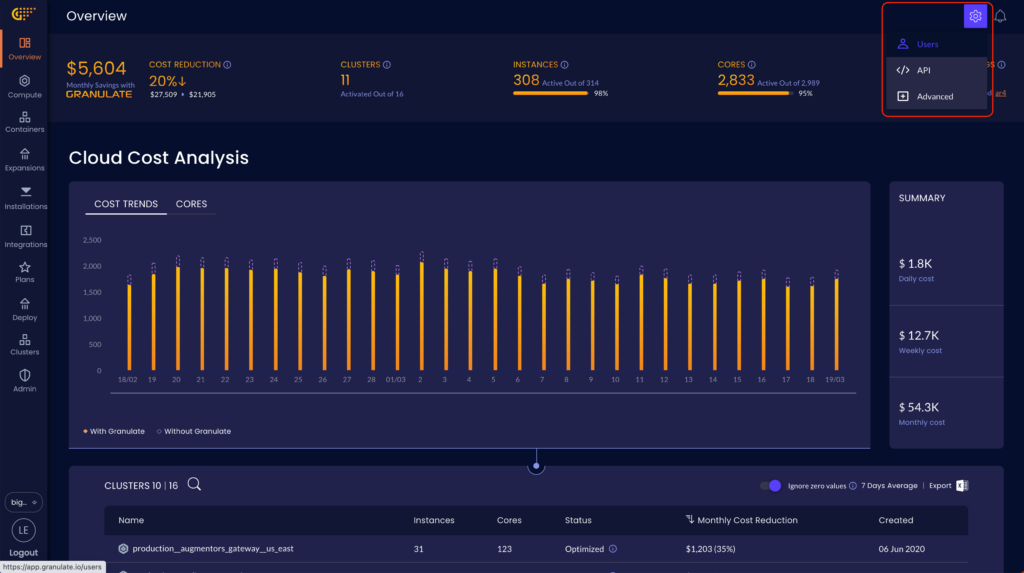
Granulate is a cloud optimization platform designed to streamline performance and reduce computing costs. Its ability to deliver real-time optimization makes it a top choice for businesses keen on making the most of their cloud infrastructure.
Why it's a good Google Cloud alternative:
I picked Granulate for its unique ability to provide real-time cloud optimization, which sets it apart from other alternatives. While Google Cloud offers broad capabilities, Granulate stands out with its specialized focus on optimizing cloud performance and reducing associated costs.
Standout Features & Integrations:
Granulate boasts continuous performance optimization, AI-driven workload management, and automatic full-stack optimization. These features work in unison with most common cloud platforms, providing compatibility and effectiveness across a range of applications and systems.
Pricing:
Pricing upon request
Pros:
- Real-time cloud performance optimization
- AI-driven workload management
- Works with most common cloud platforms
Cons:
- Pricing information not readily available
- Might be unnecessary for small-scale cloud users
- Might require a learning curve for optimal use
8. Pax8 - Best for smooth cloud procurement and management
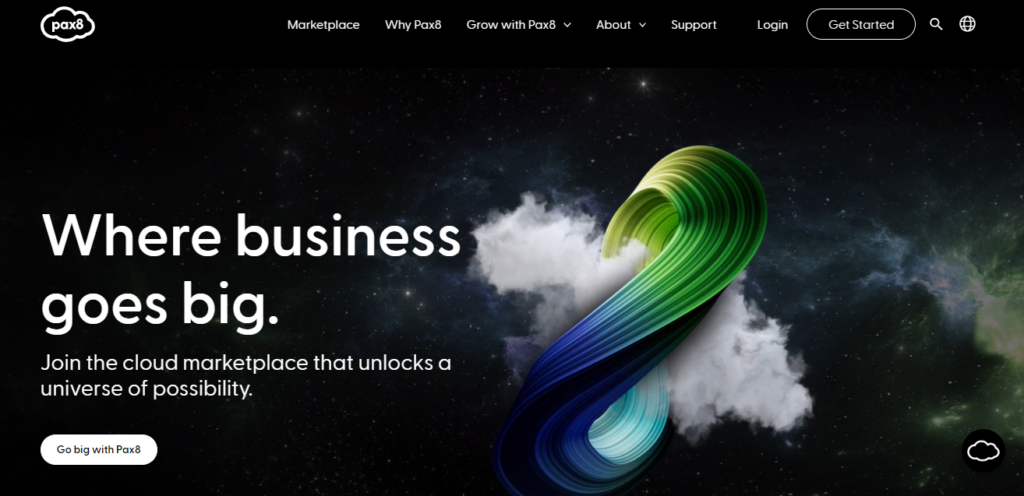
Pax8 is a cloud-based software platform that simplifies how businesses procure and manage their cloud services. It is built with the explicit goal of streamlining and simplifying cloud service management, making it an excellent choice for companies prioritizing these aspects.
Why it's a good Google Cloud alternative:
Pax8 stands out from the crowd for its streamlined approach to cloud procurement and management, something that many businesses find challenging. It differentiates itself from Google Cloud by focusing specifically on simplifying and streamlining the process of acquiring and managing cloud services.
Standout Features & Integrations:
Pax8 offers a unified cloud marketplace, automated provisioning, and simplified billing. These features integrate well with various productivity, security, and business applications, providing an efficient and straightforward cloud management experience.
Pricing:
Pricing upon request
Pros:
- Simplifies cloud procurement and management
- Offers a unified cloud marketplace
- Provides automated provisioning and simplified billing
Cons:
- Pricing information is not readily available
- Might not offer the wide range of services provided by larger cloud providers
- May not be suitable for businesses with minimal cloud services
9. Oracle Cloud Infrastructure (OCI) - Best for enterprises desiring a comprehensive suite of cloud services
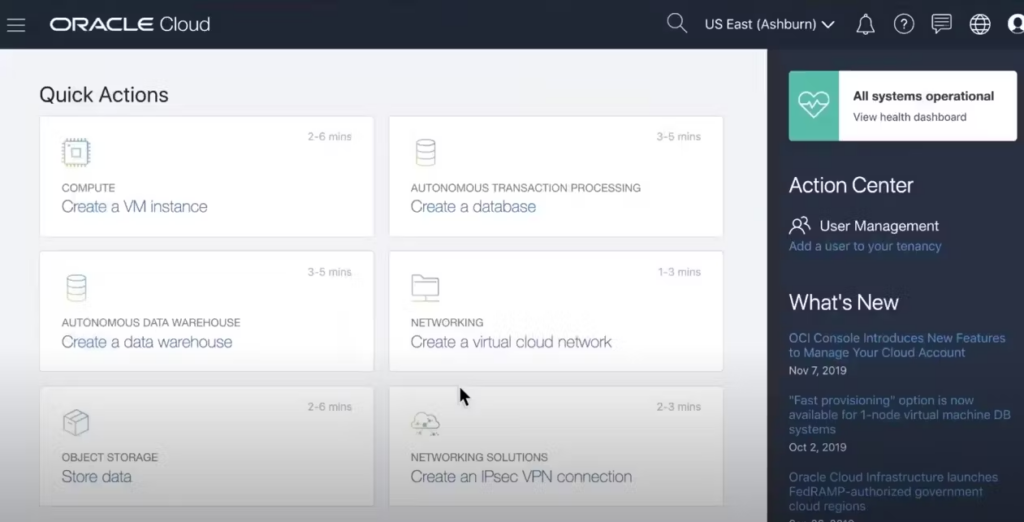
Oracle Cloud Infrastructure, or OCI, is a comprehensive cloud computing service providing businesses with a broad spectrum of cloud-based services and applications. Given its all-inclusive nature, it's ideally suited for enterprises that desire a wide array of cloud services under one roof.
Why it's a good Google Cloud alternative:
When selecting a comprehensive cloud service provider, I was drawn to Oracle Cloud Infrastructure due to its robust suite of services. It stands out in its commitment to providing a complete, integrated suite of services covering nearly all cloud computing aspects. This makes it an exceptional choice for businesses needing extensive cloud services.
Standout Features & Integrations:
OCI boasts a broad array of features, including but not limited to, high-performance computing (HPC), artificial intelligence (AI) services, and database management. The platform integrates well with various software solutions, spanning areas like CRM, ERP, and HRM, among others, making it a versatile choice for businesses.
Pricing:
Pricing begins from $25/user/month
Pros:
- Comprehensive suite of cloud services
- High-performance computing capabilities
- Extensive integrations with various software solutions
Cons:
- May be overwhelming for small businesses
- Pricing might be higher compared to other providers
- The learning curve can be steep for beginners
10. IBM Cloud - Best for businesses needing a hybrid multi-cloud platform
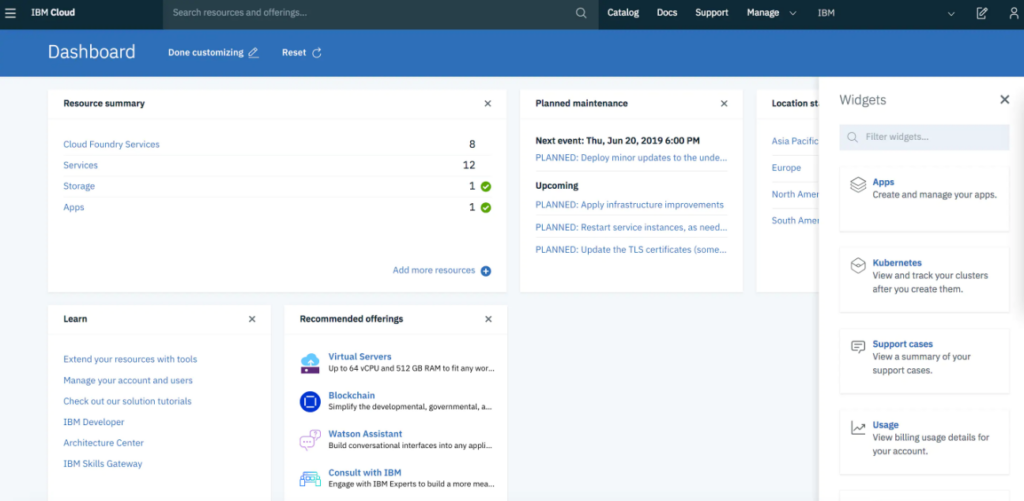
IBM Cloud is a hybrid multi-cloud platform that provides various services including IaaS, PaaS, and SaaS offerings. It suits businesses requiring a blend of on-premise, private, and public cloud resources.
Why it's a good Google Cloud alternative:
In my selection process, I included IBM Cloud on this list due to its impressive hybrid multi-cloud capabilities. It sets itself apart by supporting extensive computing options and integrating easily with multiple cloud providers. Therefore, it shines for businesses that need a flexible, hybrid multi-cloud platform.
Standout Features & Integrations:
IBM Cloud offers numerous features, such as IBM Watson for AI, blockchain services, and advanced data and analytics tools. The platform integrates efficiently with various DevOps tools, databases, and IBM’s software offerings, ensuring workflow across different platforms.
Pricing:
IBM Cloud's pricing starts from $10/user/month.
Pros:
- Robust hybrid multi-cloud capabilities
- Wide range of services including AI and blockchain
- Integrations with DevOps tools and databases
Cons:
- The user interface could be more intuitive
- Customer support can be improved
- The initial setup may be complex for beginners
11. AWS CloudWatch - Best for extensive monitoring and observability
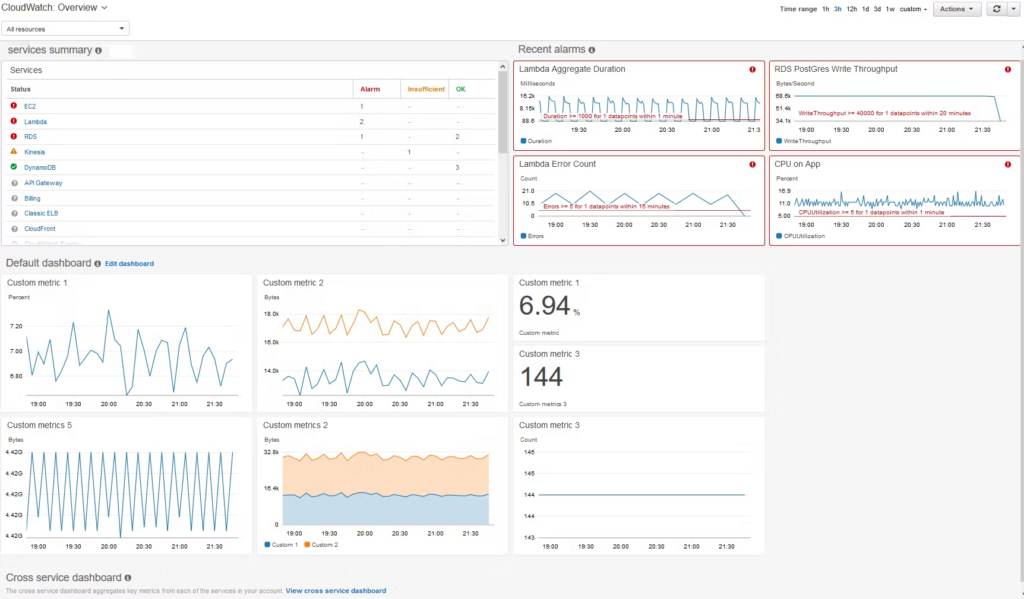
AWS CloudWatch is a robust monitoring service for AWS resources and the applications you run on AWS. It collects and tracks metrics, manages and monitors log files, and responds to system-wide performance changes. Given its comprehensive monitoring capabilities, it's especially suitable for organizations seeking extensive observability of their cloud environments.
Why it's a good Google Cloud alternative:
I selected AWS CloudWatch for this list as it provides in-depth monitoring and observability, even in large-scale environments. Its strength lies in the extensiveness of its monitoring abilities, covering metrics, logs, events, and traces. Thus, it's the best for businesses needing thorough cloud environment monitoring.
Standout Features & Integrations:
Notable features of AWS CloudWatch include anomaly detection, alarm, event management, and comprehensive observability of AWS resources and applications. It integrates well with other AWS services and supports integration with DevOps tools for increased efficiency in application deployment and monitoring.
Pricing:
Pricing for AWS CloudWatch starts at $10/user/month.
Pros:
- Comprehensive monitoring capabilities
- Robust integration with other AWS services
- Features for anomaly detection and event management
Cons:
- User interface can be complex for beginners
- More expensive compared to other monitoring tools
- Initial setup requires some technical expertise
12. Microsoft Azure - Best for businesses seeking deep integration with Microsoft services

Microsoft Azure is a comprehensive cloud computing platform offering computing, analytics, storage, and networking services. Users can choose from these services to develop and scale new applications or run existing ones in the cloud. It's an incredibly fitting for businesses already embedded in the Microsoft ecosystem, as it provides deep integration with other Microsoft services.
Why it's a good Google Cloud alternative:
In choosing Azure for this list, I considered its wide array of services and integration with other Microsoft applications. Its capacity to work smoothly with familiar tools like Office 365, SharePoint, and Dynamics 365 makes it stand out. For this reason, it is the best choice for businesses seeking to leverage their existing use of Microsoft services.
Standout Features & Integrations:
Azure provides many cloud services, including virtual machines, app services, and functions. It has strong support for AI and machine learning, along with big data analytics. Importantly, Azure integrates deeply with other Microsoft services such as Office 365, SharePoint, and Dynamics 365, as well as popular third-party tools like Salesforce.
Pricing:
Pricing for Microsoft Azure starts from $12/user/month.
Pros:
- Extensive suite of cloud services
- Deep integration with other Microsoft services
- Strong support for AI, machine learning, and big data analytics
Cons:
- Complex pricing structure
- Can be overwhelming for beginners due to the breadth of services
- Certain services may require technical expertise to set up properly
Other Noteworthy Google Cloud Alternatives
Below is a list of additional Google cloud alternatives that I shortlisted but did not make it to the top 12. Definitely worth checking them out.
- Alibaba Cloud - Good for affordable and scalable cloud computing services
- SAP Business Technology Platform - Good for companies using SAP software
- Azure Command-Line Interface (CLI) - Good for developers who prefer working in command-line environments
- VMware Cloud on AWS - Good for hybrid cloud deployments leveraging VMware's technology
- Blue Prism Intelligent Automation Platform - Good for automating repetitive business processes
- Aiven Platform - Good for managing open-source databases, search engines, and messaging systems
- Skytap - Good for migrating traditional applications to the cloud
- Red Hat Cloud - Good for enterprises adopting a containerized approach to software deployment
- Triton Compute - Good for running container-native applications in production
- Serverspace vStack Cloud Servers - Good for private cloud solutions with a focus on data security
- CloudSigma - Good for public cloud services with high flexibility and performance
- Vultr - Good for developers seeking a cloud platform with global reach
- OVHcloud - Good for private and hybrid cloud services with robust security
- DigitalOcean - Good for developers needing a simple and scalable cloud platform
- Rackspace - Good for businesses seeking managed cloud services
- Linode - Good for developers in need of affordable, customizable Linux servers
- HP Enterprise Cloud - Good for large organizations seeking hybrid cloud solutions
- OpenStack - Good for creating private clouds with open-source software
- Joyent - Good for businesses seeking container-native infrastructure
- Digital Realty - Good for businesses with global data center and colocation needs
Selection Criteria for Choosing Google Cloud Alternatives
When it comes to choosing a cloud platform as an alternative to Google Cloud, I have considered a variety of factors. Over the years, I have had the opportunity to work with and evaluate dozens of cloud tools. Still, in this particular instance, I was explicitly looking for platforms that could provide robust features, solid core functionality, and top-notch usability.
Core Functionality
A good alternative to Google Cloud should be able to offer the following:
- Compute Power: The platform must have the ability to deliver high performance for both small and large-scale applications.
- Storage: The platform should provide various options for data storage depending on the needs of the application, such as object, block, and file storage
- Networking: It should offer a secure and robust network to connect and isolate resources according to the requirements of your workload
- Database Services: The platform should provide a selection of database services to handle structured and unstructured data
Key Features
Important features that I prioritized during my evaluation included:
- Scalability: The ability of the platform to scale resources up or down based on demand
- Integration: A variety of integrations to fit into your existing tech stack and workflows
- Security: Strong security measures to protect your applications and data, including encryption and compliance standards
- Developer Tools: Availability of tools and SDKs that help developers build, deploy, and manage applications more effectively
Usability
For a cloud platform, usability comes down to a few critical factors:
- User Interface: The platform should have an intuitive interface that allows users to manage resources without too much complexity. This can include dashboards for visualizing usage, resource management panels, and more
- Documentation: Comprehensive and clear documentation is essential to help users understand how to get the most out of the platform
- Customer Support: Having a responsive and knowledgeable customer support team is key for handling any issues that arise
- Learning Curve: A platform that makes it easy to onboard new users or transition from a different platform, with educational resources or training programs, can drastically reduce the time it takes to get up and running effectively.
Most Common Questions Regarding Google Cloud Alternative (FAQs)
What are the benefits of using Google Cloud?
Google Cloud offers several key benefits. It is known for its highly scalable and flexible solutions that can be tailored to businesses of any size. It provides robust data analytics and machine learning capabilities, allowing companies to gain insights from their data like never before. Google Cloud also offers global networking, connecting services and users across regions easily.
In addition, it is committed to security and compliance, which can be a significant factor for businesses dealing with sensitive data. Lastly, Google Cloud integrates well with various Google services, which many companies already use.
How much does Google Cloud cost, and how does it compare to its alternatives?
Google Cloud's pricing is highly variable and depends on the specific services used, the scale of those services, and the region where they are deployed. Some services have a pay-as-you-go pricing model, where you pay for exactly the resources you consume. For example, pricing for Google Compute Engine starts from $0.01/hour for shared-core machines.
As for its alternatives, the pricing also varies widely. For instance, DigitalOcean pricing starts from $5/month, while AWS and Azure have similar pay-as-you-go models like Google Cloud. It's worth noting that each cloud provider has its own strengths and unique features, and the pricing often reflects that.
What are the pricing models for Google Cloud alternatives?
Many Google Cloud alternatives have a similar pay-as-you-go pricing model, where you only pay for the resources you consume. Some others, like DigitalOcean, offer simple flat-rate pricing that includes a certain allotment of resources. Some providers offer both models, allowing customers to choose based on their needs.
What is the typical range of pricing for Google Cloud alternatives?
The typical pricing range for Google Cloud alternatives can start at $5 per month (e.g., DigitalOcean) and go into hundreds or even thousands of dollars per month for larger-scale applications on platforms like AWS or Azure. Please remember it is essential to consider the specific needs of your project or business when comparing costs.
Which is the cheapest and the most expensive software?
The cheapest among the listed alternatives can be DigitalOcean, with plans starting from $5 per month. On the other hand, large-scale deployments on AWS, Azure, or IBM Cloud can be the most expensive, with costs running into thousands of dollars per month. However, it's worth noting that costs depend largely on the scale and complexity of your applications.
Are there any free Google Cloud alternatives?
Yes, some Google Cloud alternatives offer a free tier. For example, Oracle Cloud provides a free tier that includes two virtual machines, storage, and various database options. Additionally, IBM Cloud, AWS, and Azure offer free services within specific usage limits.
Other Related Software Reviews
- Cloud Service Providers
- Hybrid Cloud Storage
- Private Cloud Providers
- Cloud Analytics
- GitLab Alternatives
- Storage Management Software
- Cloud Management Platforms
Summary
In conclusion, choosing the fitting Google Cloud alternative is a multi-faceted decision that should consider several key criteria. From understanding core functionality, key features, and usability to pricing, aligning the chosen platform with your specific use case and requirements is crucial.
Key takeaways:
1. Understand Your Use Case: Before choosing an alternative, it's essential to clearly define your use case and understand the specific functionalities you need. For example, if your organization heavily relies on Microsoft products, Microsoft Azure might be a better fit due to its deep integration with other Microsoft services.
2: Evaluate Key Features: Different platforms excel in different areas. Some might have superior machine learning capabilities, while others offer better scalability or integration capabilities. It's important to identify key features that matter the most to your project or organization.
3: Consider the Pricing: Each platform has a different pricing model. Some have a pay-as-you-go model where you only pay for the resources you consume, while others offer a flat monthly rate. Could you be sure to consider the pricing structure in the context of your budget and usage pattern?
What do you think?
These insights will provide a solid starting point in your search for the right Google Cloud alternative. However, it's always a good idea to do further research and try out a few options before making a final decision. Have you used a tool that should be on this list? Do you have any experiences or insights you'd like to share? I’d love to hear from you.
